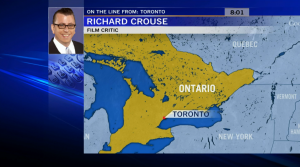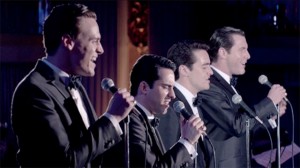Canada AM: Loss of a comedy legend: Mike Nichols dies at 83
 Richard’s “Canada AM” look at the life and career of Mike Nichols.
Richard’s “Canada AM” look at the life and career of Mike Nichols.
Watch the whole thing HERE!
 Richard’s “Canada AM” look at the life and career of Mike Nichols.
Richard’s “Canada AM” look at the life and career of Mike Nichols.
Watch the whole thing HERE!
 For it’s rotating selection of Four Seasons hits like “Sherry” and “Walk Like a Man,” “Jersey Boys” could be called a jukebox musical.
For it’s rotating selection of Four Seasons hits like “Sherry” and “Walk Like a Man,” “Jersey Boys” could be called a jukebox musical.
But not only for that reason.
Like a coin-operated jukebox that relies on push buttons, stacks of vinyl and electric inner workings to make music, “Jersey Boys” feels like a mechanical retelling of the popular Broadway show.
The story begins in 1951 Belleville, New Jersey and follows childhood friends Frankie Valli (John Lloyd Young who won a Tony for his performance of Valli on stage), Tommy DeVito (Vincent Piazza) and Nick Massi (Michael Lomenda) from the streets to the studio and with the addition of songwriter and keyboardist Bob Gaudio (Erich Bergen), from clubs to concert halls as the Four Seasons, one of the biggest selling acts in rock history. Hits like Big Girls Don’t Cry, Walk Like A Man and Can’t Take My Eyes Off You kept them at the top of the charts but ego, in-fighting and money troubles blew them apart.
Clint Eastwood has turned his camera on the Broadway hit, creating a fourth-wall-breaking musical that sticks to the basics of the original show. They were a proto-boy band—imagine New Kids on the Block without a drum machine—rubbing shoulders with the mob (in the form of Angelo ‘Gyp’ DeCarlo played by Christopher Walken) while presenting a clean-cut image that masked their scrappy real lives.
Eastwood sets up the story of the band well enough. From their hard scrapple beginnings to the height of their success, it’s a rags to riches story and when it focuses on the four band members it works. Unfortunately it takes a cast of characters to tell the tale and Eastwood seems content to allow his supporting actors to go off the charts theatrical.
Kathrine Narducci as Mary Delgado, Frankie’s wife and the woman who advised him on the sexiest spelling of his stage name (replacing a “y” with an “I” in Valli), for instance, is given a juicy scene near the beginning of the film only to allow it to spin out of control into a caricature of a femme fatale.
Speaking of stereotypes, Mike Doyle seems to be doing his best Paul Lynde impression as producer Bob Crewe.
By the time the end credits roll it’s clear that the movie is a caricature of a real life story. Nothing feels completely genuine, as if the theatricality of the stage version bled into the film.
There are some lovely set pieces that evoke an idealized 1950s New Jersey. In them the local beat cops know everybody’s name and girls at bars fall instantly in love with doo wop band singers. It feels like a postcard to the idea of what the 1950s and 60s were like. Eastwood has smoothed away all the hard edges, leaving only a finely polished “Happy Days” back lot style vision of the era.
What remains unchanged is the music. The songs are undeniably catchy and well performed by a cast, three quarters of which come from the various incarnations of the stage show. They are earworms that sound authentic, by and large thanks to Young who perfectly mimics Valli’s soaring multi-octave falsetto voice.
The bulk of the movie, unfortunately, doesn’t soar as high as Young’s voice. The Broadway show is basically a rock concert with a story. The big screen treatment requires more. As game as the actors are, they aren’t supported with enough real humanity in the script to make the audience care about them as people. The songs will stay in your head, the characters won’t.